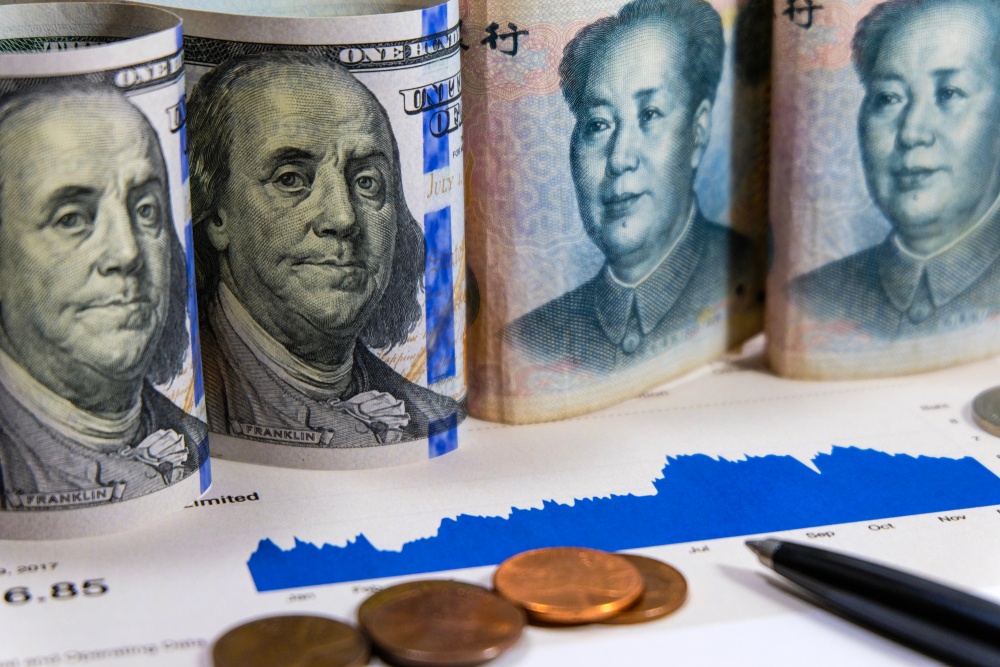
Trade War Threatens to Sap Momentum Out of Stock Market
The Dow Jones Industrial Average is up more than 13 percent year-to-date (YTD), and key sectors such as tech and finance had a strong start to 2019. Strategists generally do not anticipate a recession hitting the U.S. economy anytime soon.
Other things equal, those factors should bolster the stock market’s bull narrative.
The Dow Jones is up more than 10 percent year-to-date, but it has recently corrected from its 2019 high. | Source: Yahoo Finance)
However, if there is no deal in sight to put an end to the U.S.-China trade war that is quickly intensifying geopolitical risks in the global economy, some economists have suggested that economic growth could begin decelerating at a rapid rate.
Massive Dow Slump Looms as Trade Tensions Flare
On May 19, President Trump stated during a Fox News interview that he is “happy” with 25 percent tariffs and the billions of dollars the U.S. receives from what are essentially taxes on Chinese goods.
“A lot of people won’t be happy with this answer but I’m very happy now. We’re taking in billions of dollars, China is obviously not doing well like us. Since I’ve been President, we’ve made almost $10 trillion in wealth and China has lost $10 trillion in wealth. They’ve lost a tremendous amount. You know, you see what’s happening, their economy is not great, our economy has been fantastic,” said President Trump.
Although an extended trade dispute between the U.S. and China is likely to favor the U.S., the end result would not be pretty for either side.
According to the Wall Street Journal, large corporations in the U.S. have already begun to cut spending as fears regarding the trade war strengthen, which could deal a blow to the momentum the U.S. equities market has shown in recent months.
The slowdown of an important economic growth indicator could also amplify investor concerns in the near-term if companies continue to cut spending on U.S. factories and capital goods.
Avery Shenfeld, a senior economist at CIBC Economics, said:
“Animal spirits. With global growth already decelerating, it would take less of an additional shock to put the whole expansion at risk.”
Both countries have clear incentives to strike a comprehensive trade deal for the benefit of their respective economies and equities markets.
However, the Trump administration is seemingly unwilling to ease its demands for key changes in China’s industrial policies including the protection of U.S. intellectual property, and China is not ready to compromise with such demands on the table.
“If the bulk of this agreement is about China doing this and China doing that, that’s totally unpalatable to a domestic audience,” one source briefed on trade talks in Beijing told FT.
Why Wall Street Must Come to Terms with a Multi-Year Trade War

The trade war could go on for years, thwarting the Dow’s ability to regain the all-time high it set in 2018. | Source: Shutterstock
Friedrich Wu, a professor at Nanyang Technological University in Singapore, said that China may feel bullied by the requests of the U.S. and that its domestic audience has the persistence to absorb the pain of a multi-year trade war.
He said:
“It’s a [reversion] to the 19th century when western and Japanese powers dictated all the terms in their humiliating unequal treaties with a feeble Qing dynasty. If there is a decoupling between the two economies, so be it. The Chinese people can endure more pain than the spoiled and hubristic Americans.”
What seemed like a compelling deal for both countries is at risk of crumbling, and strategists anticipate its long-term effect on the Dow Jones could lead to a prolonged slump.
